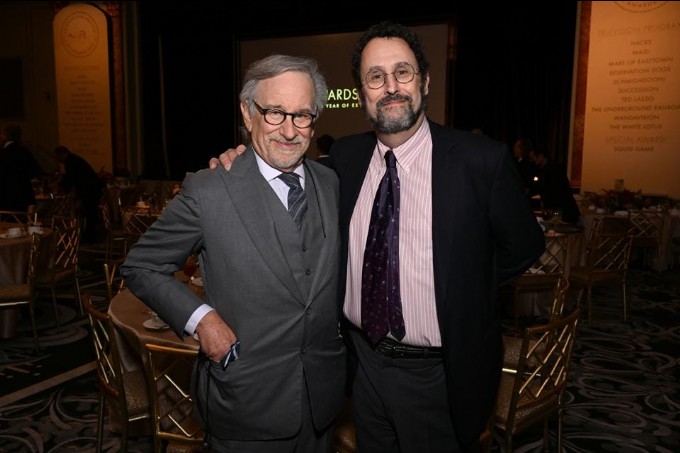Tv & Film
How Tony Kushner Became the Spielberg Whisperer
It’s fair to say that Universal’s The Fabelmans has been in the works for nearly two decades — ever since screenwriter Tony Kushner first worked with Steven Spielberg on Munich, for which Kushner earned his first Oscar nom in 2006. Seventeen years and three movies later, the pair are nominated for co-writing the original screenplay for the film, inspired by Spielberg’s own coming of age as a budding filmmaker who discovers the craft as tensions rise in his parents’ troubled marriage. Kushner, who also received a best picture nom as a producer, speaks to THR about how years of working with the director led to the first script he’s ever written with another person — and why he values the collaborative process despite its emotional challenges.
You started hearing stories about Spielberg’s youth when you first collaborated on 2005’s Munich. When did this become a formal project for the two of you?
I first suggested this to him in 2005, [but] we sort of didn’t know each other — we hadn’t really worked together very much yet. When I said, “You should make a movie about this,” I didn’t think that I would necessarily be involved. I mean, who knew that we were going to [make] four movies together? At some point, probably after [2012’s] Lincoln, it became a little bit more serious. I think it really became a possibility after his mom died [in 2017]; that’s when he started to feel that maybe this is something we would talk about, [and we started to] discuss what it might be, what areas it might cover. Then generally right around the time of West Side Story, his father, Arnold, was 102 and going through a fairly steep decline. I think Steven was bracing for that. We had [a rehearsal] period during West Side Story, which we hadn’t done in any of our films together, and that’s when Steven started to say, “You know, I’d really love to talk about this more seriously.” He also said this before, but we had some pretty big arguments [during West Side Story], and I think he even suggested that we do an interview about this proposed story of his life as a way to get a mutual reassurance that we still love each other. (Laughs.) When we finished West Side Story, that was the first time in about 17 years that we didn’t have a project we were working on. And so he said, “This looks like our next project.”
This is your fourth collaboration, but the first time you wrote a screenplay together. Was the process very different?
[For Munich,] I did a rewrite of [Eric Roth’s] version, and we both got credit for the screenplay, but I didn’t actually work with Eric face to face or anything. With Lincoln and West Side Story, [I was] entirely on my own. I’d never actually written anything with anybody before. [We began writing on the] second of October 2020; Steven and I were on a Zoom, and he said to me, “Why don’t we start?” I did all the typing, which also meant that I didn’t have to say things out loud; I could show him what I thought the next line should be in writing [using the collaboration tool in FinalDraft]. He was much more comfortable speaking. But we started with a blank page and our outline, and we wrote it word for word, line by line, together. In some ways, it was not all that different from writing a script for him. I already had enormous confidence in Steven’s ear for language and his insights about dramatic structure.

I can’t imagine not having that confidence in Steven Spielberg!
There are some directors who rely entirely on the screenwriter, who aren’t that interested in language. Steven really is, and we would never have been able to work well together if he hadn’t liked my writing. We’d already established that we had shared affinities and sensibilities in terms of the screenplay. I’ve always felt that part of my job as a collaborator is to fight for whatever I think is the right way to go on any moment, and then he has to push back. And we have to keep going, cumbersome as it may be, until one of us has convinced the other, or we’ve arrived at a synthesis — which is always the nicest point of view. I’m sure there are times that he really wished I would just shut up and go away, but he knows I’m not going to waste his time, that if I decide to make a fight about something, it’s because I think it’s important. And when he resists, I really get annoyed, and even angry sometimes. But it’s always about trying to figure each other out. That process, as difficult as it can be, is also incredibly exciting.
Latest News
It’s fair to say that Universal’s The Fabelmans has been in the works for nearly two decades — ever since screenwriter Tony Kushner first worked with Steven Spielberg on Munich, for which Kushner earned his first Oscar nom in 2006. Seventeen years and three movies later, the pair are nominated for co-writing the original screenplay for the film, inspired by Spielberg’s own coming of age as a budding filmmaker who discovers the craft as tensions rise in his parents’ troubled marriage. Kushner, who also received a best picture nom as a producer, speaks to THR about how years of working with the director led to the first script he’s ever written with another person — and why he values the collaborative process despite its emotional challenges.
You started hearing stories about Spielberg’s youth when you first collaborated on 2005’s Munich. When did this become a formal project for the two of you?
I first suggested this to him in 2005, [but] we sort of didn’t know each other — we hadn’t really worked together very much yet. When I said, “You should make a movie about this,” I didn’t think that I would necessarily be involved. I mean, who knew that we were going to [make] four movies together? At some point, probably after [2012’s] Lincoln, it became a little bit more serious. I think it really became a possibility after his mom died [in 2017]; that’s when he started to feel that maybe this is something we would talk about, [and we started to] discuss what it might be, what areas it might cover. Then generally right around the time of West Side Story, his father, Arnold, was 102 and going through a fairly steep decline. I think Steven was bracing for that. We had [a rehearsal] period during West Side Story, which we hadn’t done in any of our films together, and that’s when Steven started to say, “You know, I’d really love to talk about this more seriously.” He also said this before, but we had some pretty big arguments [during West Side Story], and I think he even suggested that we do an interview about this proposed story of his life as a way to get a mutual reassurance that we still love each other. (Laughs.) When we finished West Side Story, that was the first time in about 17 years that we didn’t have a project we were working on. And so he said, “This looks like our next project.”
This is your fourth collaboration, but the first time you wrote a screenplay together. Was the process very different?
[For Munich,] I did a rewrite of [Eric Roth’s] version, and we both got credit for the screenplay, but I didn’t actually work with Eric face to face or anything. With Lincoln and West Side Story, [I was] entirely on my own. I’d never actually written anything with anybody before. [We began writing on the] second of October 2020; Steven and I were on a Zoom, and he said to me, “Why don’t we start?” I did all the typing, which also meant that I didn’t have to say things out loud; I could show him what I thought the next line should be in writing [using the collaboration tool in FinalDraft]. He was much more comfortable speaking. But we started with a blank page and our outline, and we wrote it word for word, line by line, together. In some ways, it was not all that different from writing a script for him. I already had enormous confidence in Steven’s ear for language and his insights about dramatic structure.

I can’t imagine not having that confidence in Steven Spielberg!
There are some directors who rely entirely on the screenwriter, who aren’t that interested in language. Steven really is, and we would never have been able to work well together if he hadn’t liked my writing. We’d already established that we had shared affinities and sensibilities in terms of the screenplay. I’ve always felt that part of my job as a collaborator is to fight for whatever I think is the right way to go on any moment, and then he has to push back. And we have to keep going, cumbersome as it may be, until one of us has convinced the other, or we’ve arrived at a synthesis — which is always the nicest point of view. I’m sure there are times that he really wished I would just shut up and go away, but he knows I’m not going to waste his time, that if I decide to make a fight about something, it’s because I think it’s important. And when he resists, I really get annoyed, and even angry sometimes. But it’s always about trying to figure each other out. That process, as difficult as it can be, is also incredibly exciting.

Jennifer Lopez looks ageless in a towel in no-makeup video

Amanda Holden spanks her derriere and thanks Spanx

Amanda Holden shows off more than bargained as she dances around in her outfit of the day

Meet Harley Cameron, the stunning model who went from a BKFC ring girl to become a pro wrestler and found love

GreenGirlBella, Rocks Emirates Stadium in Painted Home Kit

Amanda Holden calls herself a 'good girl' in white dress with 'cheeky' split

Mum slammed by parents after flashing thong in school run outfit

Lottie Moss makes jaws dropp as she shows off her flawless body

Amanda Holden wears nothing beneath plunging white dress












Comments
Written news comments are in no way https://www.showbizglow.com it does not reflect the opinions and thoughts of. Comments are binding on the person who wrote them.